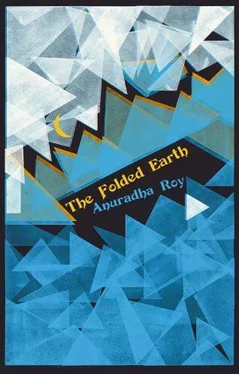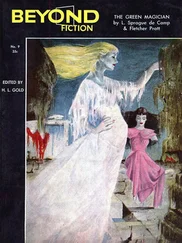I despised myself for not having had the steel to stand up for Puran during the party when Mr Chauhan had threatened him. Ramesh had protested; why didn’t I, when Puran was part of my “family”? My two worlds had never intersected this way before and when for once they did, I had not measured up. With the men who had threatened Miss Wilson today, I wondered how brave I would be if I faced real, physical danger when just their suggestion of violence made me so afraid for myself.
That afternoon, I went to the tea shack by the Jhoola Devi temple. The temple was laden with thousands of tarnished brass bells, big and small, decades old, heavy with wishes. They were everywhere: they hung from ceilings, windows, doors, railings, walls, tied to each other with bits of wire, string, fading red-gold cloth, tinsel. It was an ancient temple to which people came when in need, and tied on those brass bells for their wishes to be granted.
None of the bells were mine, but this temple had replaced the chikoo tree of my childhood. Its surrounding forests of oak, chestnut, and rhododendron were so dense and dark that when I walked through them, the sky narrowed to a road-shaped ribbon overhead. I liked the little temple’s blue pillars and flower-filled courtyard and was friends with the priest’s daughters who sat outside knitting in the sun. One of them worked in our jam-jelly unit. There was the temple dog whom I fed batashas; I waited to hear him howl in tune with the priest’s conch. The sound of the conch reminded me of a temple I used to go to with my mother in Hyderabad. She and I would meet there, unknown to my father, after I left home. We would sit together in the stone courtyard outside the temple and she would buy me a string of orange flowers from the vendors by the gateway and pin it into my hair, saying, “Be strong. The moment you have a baby, he will not wait a day, he will want you to be his daughter again.” Each time, she brought me a piece of jewellery from her box and thrust it into my hands, without a word.
The boy who ran the tea shack at Jhoola Devi made me instant noodles topped with fried onion and chopped green chillies, and a glass of gingery tea. While I ate, he pottered about, giving me the latest news on forest fires, the water supply, leopard sightings. He claimed every time to have seen a leopard, sometimes families of them. “Just before you came, not five minutes ago!” When average leopards seemed too run-of-the-mill to boast about, he said, “I know they say India has no black panthers, but I have seen one sitting here, in the middle of this very road, coal black but for a white patch on its tail, with green, shining eyes. There is another I have seen — not once but twice — it comes up from the forest on full-moon nights, and this one has square markings instead of round.”
He had to raise his voice to make himself heard that evening. Songs relayed by a microphone drowned his voice. The singing did not come from our temple, but from one further away, where a godman had taken up residence. Jeeps drew up and off-loaded fresh platoons of acolytes who marched up the hill to his temple. The way to it was festooned with banners and garlands.
“It’s started early this time,” the boy said, when I asked him what the noise was for. “It’s not for a religious festival — the Baba has come for the elections. He’ll be here for the next six months.” The boy’s smile was wide and untroubled. “It’s great for business, as long as it lasts!”
Sanki Puran had no recollection of his cow having aimed a kick at the Brigadier, but Mr Chauhan’s neck throbbed with stress each time he allowed his thoughts to return to that party. He had tended, since that day, to encounter Puran at every turn: smelly, slovenly, a disgrace. What was more, he grazed his animals on precisely those slopes where Mr Chauhan had planted signs both in Hindi and in English announcing fines for illegal grazing. Puran was not acquainted with the alphabet in either language, but he welcomed the iron signboards because the posts they stood upon provided sturdy places to tether cattle.
Throughout his working life, Mr Chauhan had despaired over the lack of discipline, civic sense and hard work among his fellow citizens, but what he saw around him in the hill country beat everything he had ever been exasperated by before. It was as if people were on holiday all the time. Apart from getting drunk or gossiping around the peanut seller’s charcoal brazier, Mr Chauhan did not see the men doing anything at all. And of all the men he saw, Sanki Puran grated the most. “Not only is he a shiftless rowdy,” he told his wife, “he is shiftless and rowdy in an army uniform. But I have decided what I need to do, for a start.”
His wife saw that familiar gleam in his eyes and smiled. He really did know how to change things. She remembered the time when they had been posted in a cantonment town in Uttar Pradesh, where too he was Administrator, “responsible for everything from light in a bulb and water in the tap, to keeping the cantonment clean and green”. His notion of “clean” included reforming the morals of the young. He came up with a novel scheme. He sent the police around to all the public parks in the cantonment area and wherever they came upon romancing teenagers, the policemen frightened them out of their wits by taking their pictures, demanding their names and addresses, and threatening to inform their parents of — as Mr Chauhan put it — their “extra-curricular activities”. “This is when you should be studying, not being obscene in parks,” Mr Chauhan had thundered at a cowering couple on the first raid, one that he had personally conducted to show the staff how to go about it. Mrs Chauhan narrated this story of her husband’s innovative thinking to many people in Ranikhet and told them she was sure he had thought of something similarly novel and exemplary for the insane cowherd.
What happened a few days after the party later became a frightening haze in Puran’s head. It was around midday. He had been sitting at the edge of the slope next to his cows. He had tied Gangu, the skittish young one, to a tree, spoken some sense into the wobbly, large-eyed new calf that was unable to draw enough milk from its mother, and then sat back on his haunches, smoking grass. Charu was at some distance, high up in a tall oak tree, cutting fodder with her sickle. She saw the four men approach Puran but returned to cutting oak leaves, not for a moment imagining what they were going to do.
Without warning Puran felt rough hands on his shoulders, harsh voices in his ear, giving him instructions: he could not tell what. He saw nothing but a blur of laughing faces. They thrust him into a jeep. He responded with keening, terrified, animal sounds to its unfamiliar rolling motion as it charged off, taking bends and slopes at high speed. The men slapped him around the ears and shouted, “Arre yaar, shut up! Chootiya! Donkey!” Then they stopped the vehicle, pushed him out, stripped him down to his threadbare underpants and thrust him under a roadside tap. The icy water clawed at him. They threw a bar of bright green soap towards him. He shivered at the unexpected feel of open air on his near-naked body. It made him ache with the cold. He clutched the soap not knowing what he was expected to do with it.
One of the men who was kinder than the others tried telling him something, then, getting no response, rolled up his sleeves, took the soap from his hand and lathered him all over while the other men screamed with laughter and slapped their thighs, shouting, “Mammi, Mammi, give him a good wash!” Puran’s knees knocked and he clasped his hands over his crotch. A small knot of people had gathered by this time, some of them waiting with empty canisters and buckets for their turn at the tap. Nobody dared raising a protest against the men, among whom they recognised Mr Chauhan’s guard, driver, and chowkidar. Some of the gathered people thought it was a joke. Some said, “Good thing, that crazy Puran really needed a bath.”
Читать дальше












